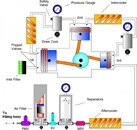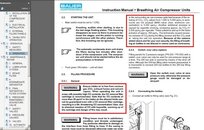I've owned a couple of compressors. Yes, corrosion occurs through salt water intrusion. There are 2 ways I know of that salt water an get into a cylinder - when the cylinder is emptied and submerged and when the compressor puts it in there. If a compressor is allowing moisture into a cylinder, there are likely to be other issues at hand. Maybe you should think outside of the box.
Thinking "outside the box" when it comes to simple mechanical devices is generally reffered to as "wishful thinking." CO in a compressor is the result of lubricant ignition or CO being sucked in the intake from another source, water in a tank is the result of entirely different and unrelated failures.

In all compressors the high compression pressures result in high temperature of the discharged air, hot air holds more water than cool air, this must be controlled and is, of course, an important consideration.
Give scuba compressors' rather high discharge pressures are compression is usually done in two or more stages with some method of cooling the air between stages. Aftercoolers or heat exchangers are used used to lower the temperature and to precipitate out as much of the water as possible. While it is quite important to remove water from heated compressed air, especially since water becomes acidic at about 180 degrees, that is entirely irrelevant to the intake of CO or the dieseling of a compressor stage. If there is water in a tank as a result of filling you need to look to the cooling systems and the moisture separators, while if there is CO in the output gas you need to look to the intake, the lubricant, the rings, and compressor overheating.
Now, is it possible for one failure, to cause the other, or to be part of a shared symptomology? CO can cause wet air, but can wet air cause CO? No, wet air can not cause CO, but it can degrade some filtration systems that are in place as backups, note Bauer's recommendation that a CO filter be used in areas where there is a possibility of high CO.

So what we have here is a situation wherein CO in the compressor output is not a normal byproduct that get "cleaned up" but rather is a symptom of a problem with a compressor that is totally unrelated to the sorts of problems that produce wet air. I believe that wet air can shorten the life of a CO filter system, but such systems should not be relied on anyway since I do not believe that they can be expected to do any better than produce Grade D air.






